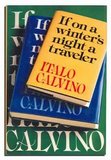If on a winter's night a traveler by Italo Calvino
 If I had encountered this book earlier, when I was still pretending to be an academic, I’d have loved it because I’ve always been interested in readers and writers, especially their roles and expectations which Calvino discusses at length in this novel. I’ve also always been interested in self-reflexive novels, that is, those that make the reader aware of themselves as fiction, rather than trying to very hard to maintain the illusion of reality—and that too is what this novel is about.
If I had encountered this book earlier, when I was still pretending to be an academic, I’d have loved it because I’ve always been interested in readers and writers, especially their roles and expectations which Calvino discusses at length in this novel. I’ve also always been interested in self-reflexive novels, that is, those that make the reader aware of themselves as fiction, rather than trying to very hard to maintain the illusion of reality—and that too is what this novel is about.The story—there is one amidst all the ideas—is of two readers, the first addressed as “you” right away to involve the reader, who begins reading a new novel by Italo Calvino called If on a winter’s night a traveler. Unfortunately, he discovers that the book is misprinted and he can’t finished it so he goes back to the bookstore where he bought it to exchange his copy. There he meets the second reader, Ludmilla, who has the same problem. The reader, however, soon discovers that the second book is not the same novel but one called Outside the town of Malbork by a totally different writer. Thereafter every other chapter is the beginning of a new novel (none of which does the reader get to finish, but all the titles of which, added together, make quite an interesting paragraph). The intervening numbered chapters follow the adventures of the readers and contain a great deal of discussion of roles of readers and writers, of the minutiae of the book publishing and marketing, of authorial intention and readers’ expectations, of such diverse topics as translation, pornography, beginnings and endings, fiction and reality, etc.
It’s a very clever book, but somewhat less interesting to me now than it would have been when I first started reading postmodern novels, all of which speculate on these same issues in various sorts of ways. It takes me back to my first interest in the roles of readers and writers which came from Father Walter J. Ong’s essay, “The Writer’s Audience is Always a Fiction”, published in PMLA.
[Ong, Walter J., S.J. "The Writer's Audience Is Always a Fiction." PMLA 90 (January 1975): 9–21. Writers project audiences for their work by imagining the presumptive audiences of other pieces of writing. Readers seem willing to be fictionalized in this way—to be the audience projected by the writer—as long as the reader's role is familiar or the writer creates a new role persuasively. Thus, the writer's style or voice is a way of addressing an imagined audience that will respond in the desired way.] –from a bibliography I found on the web.
Ong's speciality, like Marshall MacLuhan's (they were friends and colleagues before the latter went to Canada), was really the difference between oral and written language. But that turned out to be a precursor to discussions of how written language really "worked" which led scholars to semiotics and deconstructionalism and writers to postmodernism. Huge generalization I know...
So all I can say is it’s a shame I didn’t read this novel earlier. It would have fit right in with my interests and ideas. Now it seems a bit dated since I’ve read so many postmodern novels and speculated myself about so many of the ideas Calvino raises. Had I read it soon after its publication, it would have seemed marvelously fresh and brilliant.


0 Comments:
Post a Comment
<< Home